外研版(2019) 选择性必修第二册 Unit 1 Growing Up Developing ideas 课件(21张PPT)
文档属性
| 名称 | 外研版(2019) 选择性必修第二册 Unit 1 Growing Up Developing ideas 课件(21张PPT) |  | |
| 格式 | pptx | ||
| 文件大小 | 7.3MB | ||
| 资源类型 | 教案 | ||
| 版本资源 | 外研版(2019) | ||
| 科目 | 英语 | ||
| 更新时间 | 2022-09-29 21:57:08 | ||
图片预览

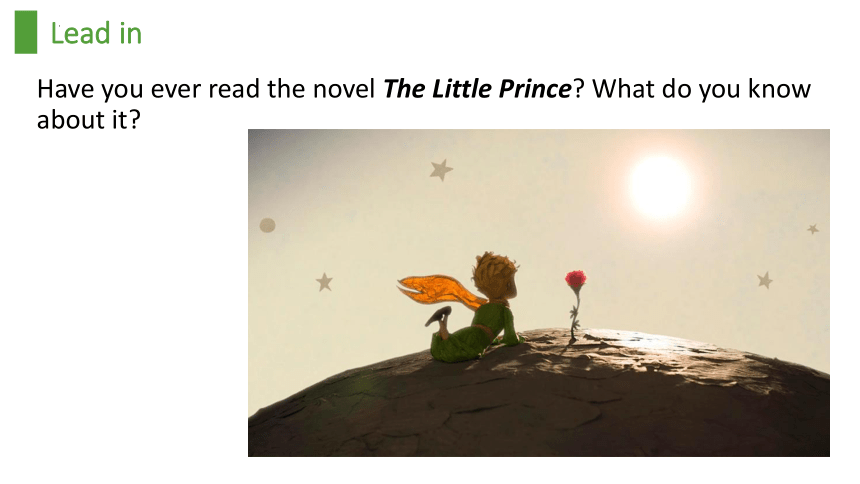
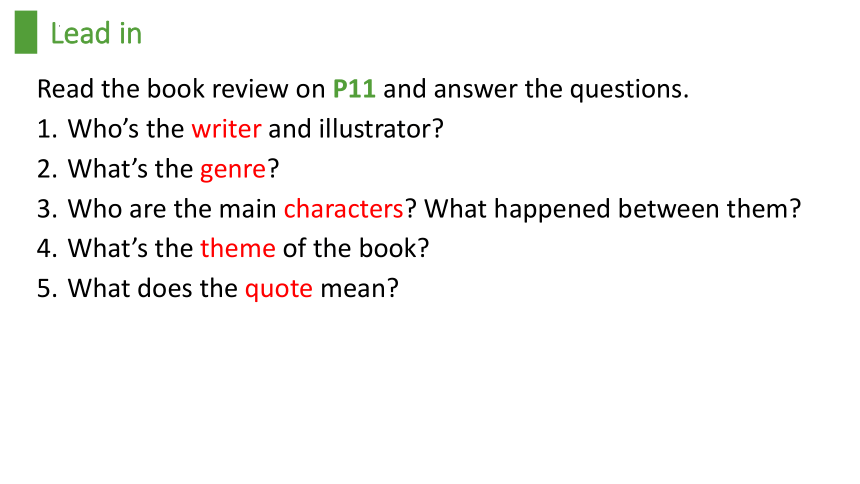
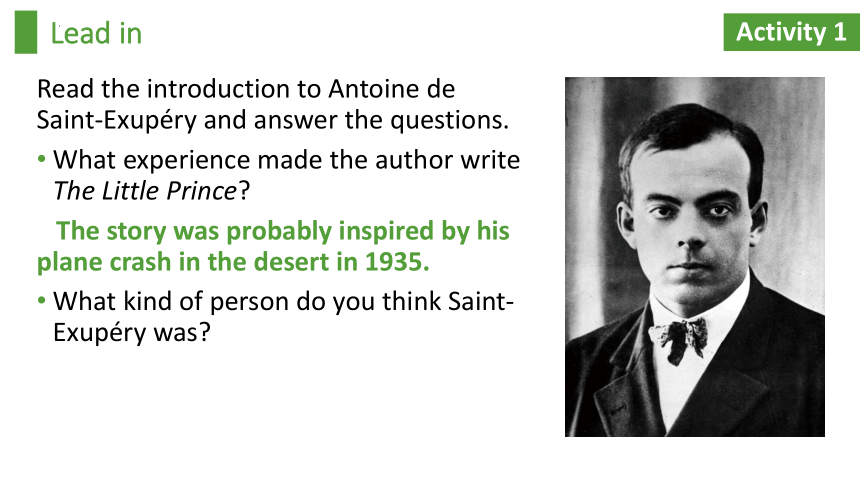
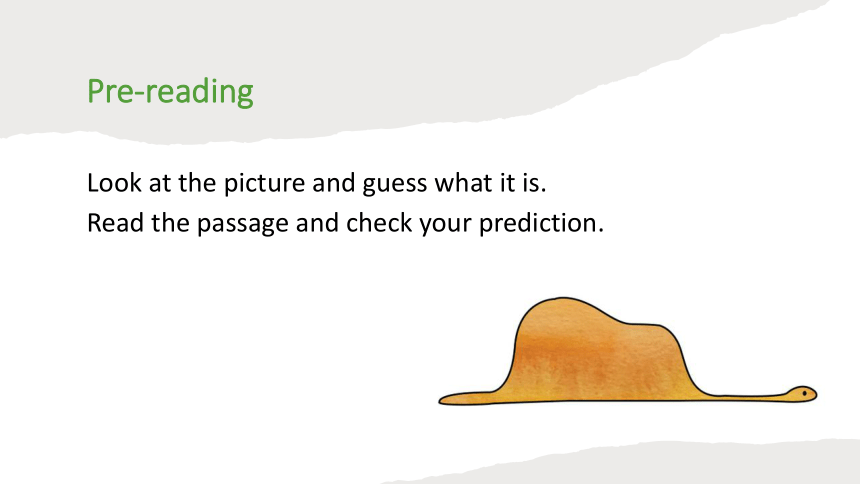
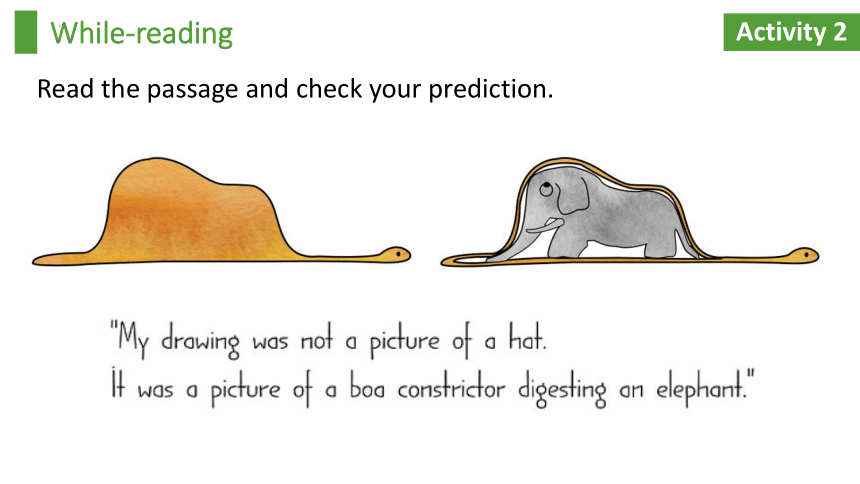
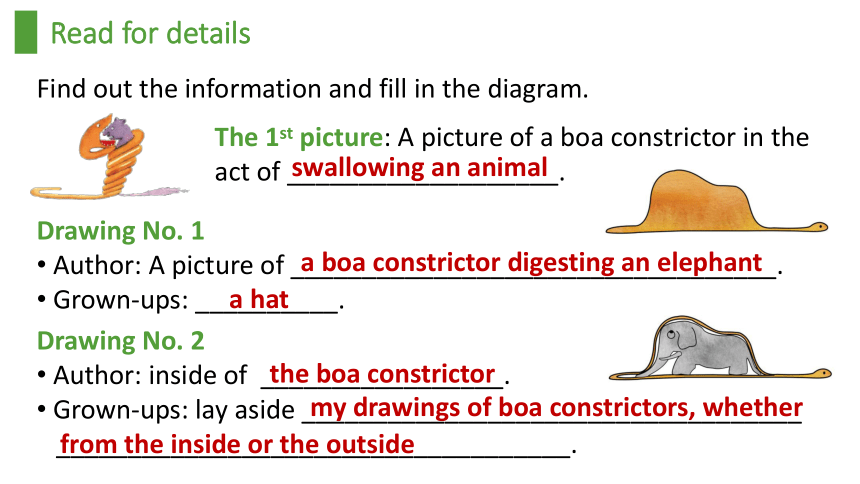
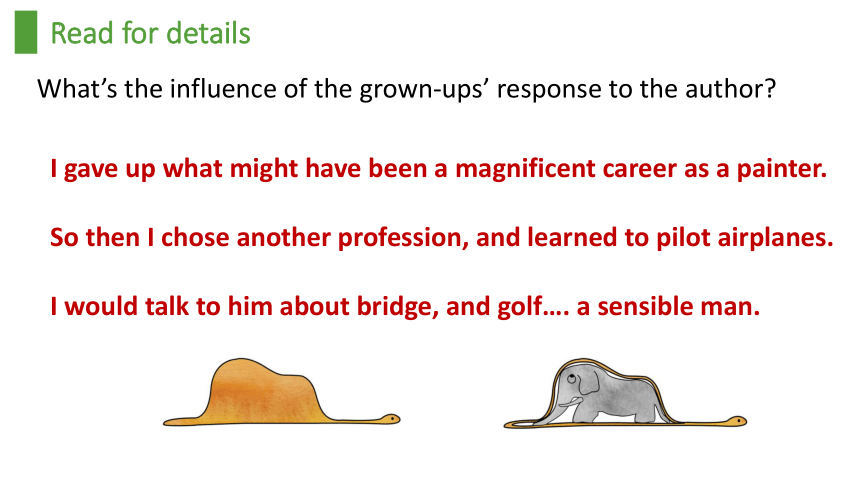
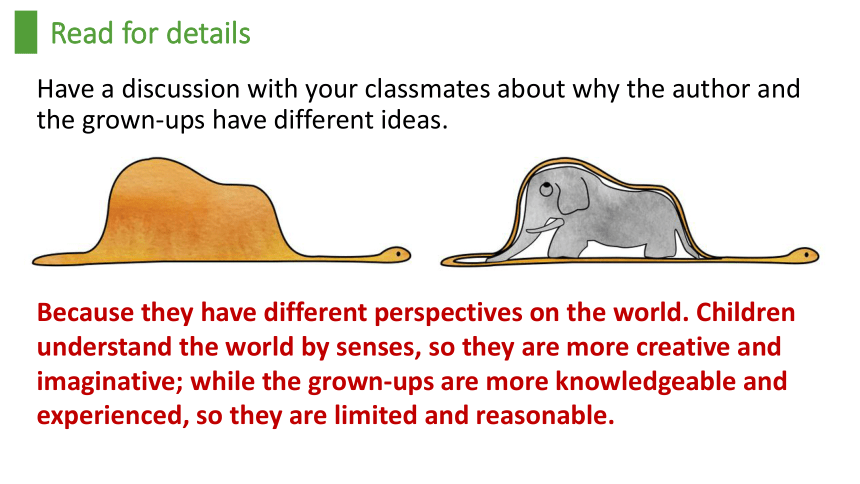
文档简介
(共21张PPT)
B5U1
Developing ideas
Lead in
Have you ever read the novel The Little Prince What do you know about it
Lead in
Read the book review on P11 and answer the questions.
Who’s the writer and illustrator
What’s the genre
Who are the main characters What happened between them
What’s the theme of the book
What does the quote mean
Lead in
Read the introduction to Antoine de Saint-Exupéry and answer the questions.
What experience made the author write The Little Prince
The story was probably inspired by his plane crash in the desert in 1935.
What kind of person do you think Saint-Exupéry was
Activity 1
Pre-reading
Look at the picture and guess what it is.
Read the passage and check your prediction.
While-reading
Read the passage and check your prediction.
Activity 2
Find out the information and fill in the diagram.
Drawing No. 2
Author: inside of _________________.
Grown-ups: lay aside ___________________________________
____________________________________.
Read for details
The 1st picture: A picture of a boa constrictor in the act of ___________________.
swallowing an animal
Drawing No. 1
Author: A picture of __________________________________.
Grown-ups: __________.
a boa constrictor digesting an elephant
a hat
the boa constrictor
my drawings of boa constrictors, whether
from the inside or the outside
Read for details
What’s the influence of the grown-ups’ response to the author
I gave up what might have been a magnificent career as a painter.
So then I chose another profession, and learned to pilot airplanes.
I would talk to him about bridge, and golf…. a sensible man.
Read for details
Have a discussion with your classmates about why the author and the grown-ups have different ideas.
Because they have different perspectives on the world. Children understand the world by senses, so they are more creative and imaginative; while the grown-ups are more knowledgeable and experienced, so they are limited and reasonable.
Read for attitude
Choose the author’s attitude towards grown-ups and find evidence to support your choice.
1 Grown-ups are more practical than children. They want to teach children knowledge that will be useful in the future.
2 Grown-ups are no better than children. They lack imagination and only care about matters of consequence.
3 Grown-ups are more knowledgeable than children. They can understand everything by themselves.
Activity 3
Read for attitude
2 Grown-ups are no better than children. They lack imagination and only care about matters of consequence.
Evidence:
1. They always need to have things explained. (Para. 6)
2. Grown-ups never understand anything by themselves, and it is tiresome for children to be always and forever explaining things to them. (Para. 7)
3. …, I have had a great many encounters with a great many people who have been concerned with matters of consequence. (Para. 9)
4. I would bring myself down to his level. I would talk to him about bridge, and golf, and politics, and neckties. And the grown-up would be greatly pleased to have met such a sensible man. (Para. 12)
Activity 3
Read for writing techniques
Read the sentences from the passage and answer the questions.
1 What does the author really mean by these sentences
2 What figure of speech does the author use How does this figure of speech help to express the author’s attitude
Activity 4
Read for writing techniques
Read the sentences from the passage and answer the questions.
1 What does the author really mean by these sentences
Most of the grown-ups I have met are the same. They focus on practical matters only and seldom pay attention to imagination or creativity. If I pretend to think the way they do, the adults will conclude that I am sensible and mature.
Activity 4
Read for writing techniques
Read the sentences from the passage and answer the questions.
2 What figure of speech does the author use How does this figure of speech help to express the author’s attitude
Irony. This figure of speech enables the author to indicate his low opinion of adults’ behaviour and values by stressing such things.
Activity 4
Learning to learn
Irony is a subtle figure of speech that refers to things one says that are the opposite of what one really means. It has a humorous or sarcastic effect. For example:
Fine, don’t buy me an airline ticket. I’ll just swim across the ocean!
Think and share
According to the author, what is a child’s most valuable trait Do you agree with him
Imagination and genuineness.
Activity 5
Useful expressions
着迷于
漫步
去打仗
被占领的
至今未知
magnificent
primeval/primaeval /pra 'mi v( )l/
在……过程中
Here is a copy of the drawing.
the book sold 200 copies within two weeks.
有些书可以浅尝辄止,有些书可以生吞,而有少数书应该细嚼慢咽,融会贯通。
be obsessed with
wander
leave on a wartime mission
occupied
remain unknown
splendid/impressive
原始的
in the act of
副本;份
Some books are to be tasted, others to be swallowed, and some few to be chewed and digested.
Useful expressions
ponder over/at/about
成功做……
回应 v./n.
lay aside
致力于
disheartened by
It is __________ (tire) for children ________ always and forever ____________ (explain) things to them.
职业
驾驶飞机
看/瞥一眼
深思
succeed in (doing) sth.
respond to/in response to
放弃;搁置一边
devote/dedicate/commit myself to…
be devoted/dedicated/committed to
discouraged by
profession
pilot (v.) planes
at a glance
tiresome
to be
explaining
Useful expressions
区别A与B
有价值的
生命途中
许多
相遇 v./n.
后果
对……太关心
intimately
close at hand
distinguish A from B
valuable
[SYN.] priceless/invaluable
[OPP.] valueless/worthless
in the course of life
a good/great many + n. (pl.)
a good/great deal + of + n. [U]
encounter; have an encounter with…
consequence
be concerned with…
亲密地
近在手边
Useful expressions
clear-sighted
bring myself down to one’s level
sensible
比较 sensitive
有清晰判断能力的
贬低我自己到他的水平
明智的;理智的
敏感的
Useful expressions
由……配插图的
科幻小说
坠机
描述自己的冒险
透过表面看本质
难忘的
与……建立纽带
对……负责
无论年龄
be illustrated by…
fantasy book/novel
crash (on/in…) n./v.
recount one’s adventures
look beneath the surface of things to uncover their real meanings
memorable
form special bonds with…
take responsibility for
whatever their age
B5U1
Developing ideas
Lead in
Have you ever read the novel The Little Prince What do you know about it
Lead in
Read the book review on P11 and answer the questions.
Who’s the writer and illustrator
What’s the genre
Who are the main characters What happened between them
What’s the theme of the book
What does the quote mean
Lead in
Read the introduction to Antoine de Saint-Exupéry and answer the questions.
What experience made the author write The Little Prince
The story was probably inspired by his plane crash in the desert in 1935.
What kind of person do you think Saint-Exupéry was
Activity 1
Pre-reading
Look at the picture and guess what it is.
Read the passage and check your prediction.
While-reading
Read the passage and check your prediction.
Activity 2
Find out the information and fill in the diagram.
Drawing No. 2
Author: inside of _________________.
Grown-ups: lay aside ___________________________________
____________________________________.
Read for details
The 1st picture: A picture of a boa constrictor in the act of ___________________.
swallowing an animal
Drawing No. 1
Author: A picture of __________________________________.
Grown-ups: __________.
a boa constrictor digesting an elephant
a hat
the boa constrictor
my drawings of boa constrictors, whether
from the inside or the outside
Read for details
What’s the influence of the grown-ups’ response to the author
I gave up what might have been a magnificent career as a painter.
So then I chose another profession, and learned to pilot airplanes.
I would talk to him about bridge, and golf…. a sensible man.
Read for details
Have a discussion with your classmates about why the author and the grown-ups have different ideas.
Because they have different perspectives on the world. Children understand the world by senses, so they are more creative and imaginative; while the grown-ups are more knowledgeable and experienced, so they are limited and reasonable.
Read for attitude
Choose the author’s attitude towards grown-ups and find evidence to support your choice.
1 Grown-ups are more practical than children. They want to teach children knowledge that will be useful in the future.
2 Grown-ups are no better than children. They lack imagination and only care about matters of consequence.
3 Grown-ups are more knowledgeable than children. They can understand everything by themselves.
Activity 3
Read for attitude
2 Grown-ups are no better than children. They lack imagination and only care about matters of consequence.
Evidence:
1. They always need to have things explained. (Para. 6)
2. Grown-ups never understand anything by themselves, and it is tiresome for children to be always and forever explaining things to them. (Para. 7)
3. …, I have had a great many encounters with a great many people who have been concerned with matters of consequence. (Para. 9)
4. I would bring myself down to his level. I would talk to him about bridge, and golf, and politics, and neckties. And the grown-up would be greatly pleased to have met such a sensible man. (Para. 12)
Activity 3
Read for writing techniques
Read the sentences from the passage and answer the questions.
1 What does the author really mean by these sentences
2 What figure of speech does the author use How does this figure of speech help to express the author’s attitude
Activity 4
Read for writing techniques
Read the sentences from the passage and answer the questions.
1 What does the author really mean by these sentences
Most of the grown-ups I have met are the same. They focus on practical matters only and seldom pay attention to imagination or creativity. If I pretend to think the way they do, the adults will conclude that I am sensible and mature.
Activity 4
Read for writing techniques
Read the sentences from the passage and answer the questions.
2 What figure of speech does the author use How does this figure of speech help to express the author’s attitude
Irony. This figure of speech enables the author to indicate his low opinion of adults’ behaviour and values by stressing such things.
Activity 4
Learning to learn
Irony is a subtle figure of speech that refers to things one says that are the opposite of what one really means. It has a humorous or sarcastic effect. For example:
Fine, don’t buy me an airline ticket. I’ll just swim across the ocean!
Think and share
According to the author, what is a child’s most valuable trait Do you agree with him
Imagination and genuineness.
Activity 5
Useful expressions
着迷于
漫步
去打仗
被占领的
至今未知
magnificent
primeval/primaeval /pra 'mi v( )l/
在……过程中
Here is a copy of the drawing.
the book sold 200 copies within two weeks.
有些书可以浅尝辄止,有些书可以生吞,而有少数书应该细嚼慢咽,融会贯通。
be obsessed with
wander
leave on a wartime mission
occupied
remain unknown
splendid/impressive
原始的
in the act of
副本;份
Some books are to be tasted, others to be swallowed, and some few to be chewed and digested.
Useful expressions
ponder over/at/about
成功做……
回应 v./n.
lay aside
致力于
disheartened by
It is __________ (tire) for children ________ always and forever ____________ (explain) things to them.
职业
驾驶飞机
看/瞥一眼
深思
succeed in (doing) sth.
respond to/in response to
放弃;搁置一边
devote/dedicate/commit myself to…
be devoted/dedicated/committed to
discouraged by
profession
pilot (v.) planes
at a glance
tiresome
to be
explaining
Useful expressions
区别A与B
有价值的
生命途中
许多
相遇 v./n.
后果
对……太关心
intimately
close at hand
distinguish A from B
valuable
[SYN.] priceless/invaluable
[OPP.] valueless/worthless
in the course of life
a good/great many + n. (pl.)
a good/great deal + of + n. [U]
encounter; have an encounter with…
consequence
be concerned with…
亲密地
近在手边
Useful expressions
clear-sighted
bring myself down to one’s level
sensible
比较 sensitive
有清晰判断能力的
贬低我自己到他的水平
明智的;理智的
敏感的
Useful expressions
由……配插图的
科幻小说
坠机
描述自己的冒险
透过表面看本质
难忘的
与……建立纽带
对……负责
无论年龄
be illustrated by…
fantasy book/novel
crash (on/in…) n./v.
recount one’s adventures
look beneath the surface of things to uncover their real meanings
memorable
form special bonds with…
take responsibility for
whatever their age
